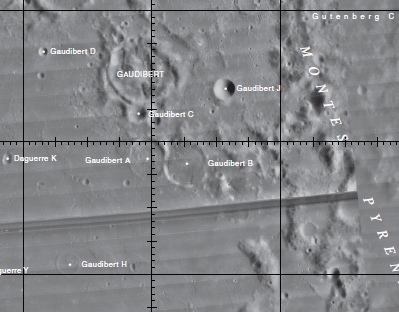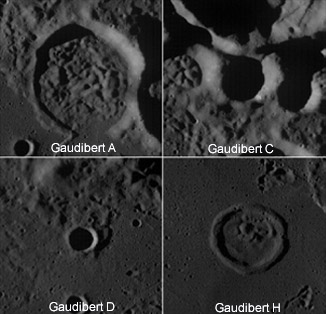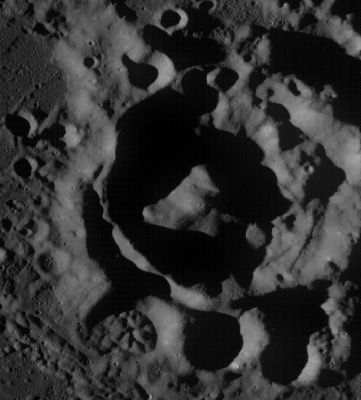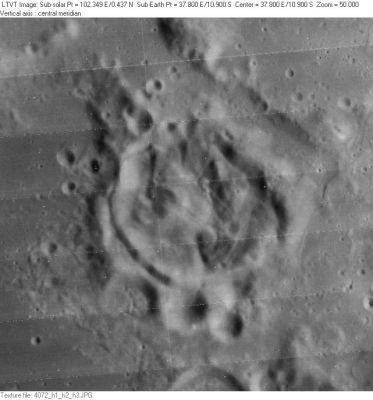Gaudibert
Contents
Gaudibert
|
Lat: 10.9°S, Long: 37.8°E, Diam: 34 km, Depth: 0.62 km, Rükl: 47 | |
Right: LO-IV-072H Gaudibert is the oddly-shaped crater in the center. The 9-km crater touching its rim at 6 o’clock is Gaudibert C. Below that, the north rim of 21-km Gaudibert A is visible along the bottom margin.
Images
LPOD Photo Gallery Lunar Orbiter Images Apollo Images
Maps
(LAC zone 79D2) LAC map Geologic map LTO map
Description
Description: Wikipedia
Additional Information
- Depth data from Kurt Fisher database
- Westfall, 2000: 0.62 km
- Viscardy, 1985: 1.6 km
- Cherrington, 1969: 1.58 km
- Central peak height:
- Sekiguchi, 1972:
- western hill: 2.5 km
- eastern hill: 2.0 km - fatastronomer fatastronomer
- Sekiguchi, 1972:
- Mysterious Gaudibert Crater - Some information on the morphology of Gaudibert as featured in 'Image of the Week' (02/24/2009) from the Apollo Image Archive.
Nomenclature
- Named for Casimir Marie Gaudibert (1823-1901), a French astronomer.
- According to Whitaker (p. 226), this name was introduced by Krieger and König.
- In 1887, Gaudibert, under the direction of Camille Flammarion (and with Léon Fenet doing the art work), published a lunar map in which they introduced six names later adopted into the original IAU nomenclature: Carpenter, Flammarion, Frères Henry (meaning since changed), Mouchez, Nasmyth and Rutherfurd (Whitaker, p. 150). A small reproduction of the map appears on p. 149 of Whitaker's book. - Jim Mosher
Lettered Craters


Left: Excerpt from the USGS Digital Atlas of the Moon - LAC 79.
Right: WAC view (M117249908ME) of the lettered craters. Click image for larger view.
LPOD Articles
A Crater of Multiple Strangeness
Bibliography
Hawke, B. A. et al (1997) Remote Sensing Studies of Geologic Units in the Eastern Nectaris Region of the Moon - from the 28th Lunar And Planetary Institute Conference 1997.
C. Gaudibert in the Sourcebook Project:
- Curious Lunar Formation (English Mechanic, 1874), see: Mysterious Universe, a handbook of astronomical anomalies (William R. Corliss, The Sourcebook Project, 1979).

